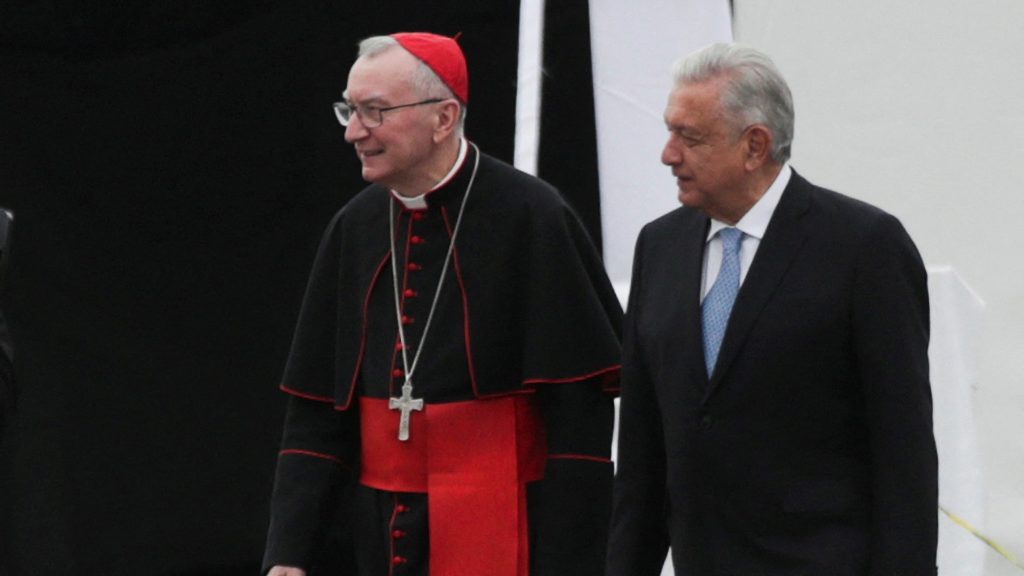Speaking in a conference with Mexico's foreign relations secretary, the Vatican secretary of state lauded church-state relations in Mexico as exemplary -- an acknowledgment of the church's improved standing in a country where priests were previously persecuted and Catholic rebels took up arms against an anti-clerical government.
"Today (in Mexico) church and state are called to be an example for other countries to show that it is possible to overcome extremism and polarization, increasingly creating a culture of fraternity, freedom, dialogue and solidarity," Cardinal Pietro Parolin said April 26 at a conference marking the 30th anniversary of Mexico and the Vatican establishing diplomatic relations.
"Perhaps it's premature to offer an evaluation," Cardinal Parolin said. "But being aware of the long and complex historical path completed in Mexico in church-state relations, it is important ... to look to the future, opening new spaces for dialogue and institutional collaboration."
Mexico and the Vatican officially established diplomatic relations in 1992, ending a period of the Catholic Church not having official legal status in the country. The approval that year of the Religious Associations and Public Worship Law removed anti-clerical measures such as rules prohibiting priests and nuns from wearing their habits in public.
Relations reached such an acrimonious point early in the past century that the Cristero Rebellion erupted in western Mexico between 1926 and 1929, and churches were closed.
Church observers say church-state relations existed informally prior to 1992, but were discreet -- to the point then-President José López Portillo welcomed St. John Paul II upon his arrival in 1979 with the terse greeting: "I leave you in the hands of the hierarchy and the faithful of your church and may everything be for the good of humanity."
Mexican politicians, who in past years avoided public appearances with prelates, have subsequently sought out the pope for photo ops. Church observers say the 1992 restoral of relations came as then-President Carlos Salinas de Gortari sought legitimacy for a suite of structural reforms, including privatizing hundreds of state-run enterprises.
Foreign Secretary Marcelo Ebrard -- who fell out of favor with church leaders when he was Mexico City mayor after promoting laws decriminalizing abortion and allowing same-sex marriage -- appeared with Cardinal Parolin at the conference. Many people believe Ebrard has presidential aspirations.
"I see increasing action from the Holy See and Mexico in the international arena, in favor of peace in a difficult, uncertain and conflictive world that lies ahead of us," Ebrard said. The Vatican and Mexico, he added, coincide on "the search for peace and taking concrete actions to reduce arms trafficking, the production of weapons, the proliferation of weapons around the world."
Prior to the conference, Cardinal Parolin met with President Andrés Manuel López Obrador at the National Palace. Both men later walked together to the inauguration of a temporary replica of the Sistine Chapel built in the central Zócalo square.
Neither Cardinal Parolin nor López Obrador commented on their meeting. López Obrador, who identifies as "Christian," later tweeted, "Relations with the Catholic Church translate into friendship and respect. ... I personally consider Pope Francis to be an exceptional spiritual leader and humanist."
Mexico City Mayor Claudia Sheinbaum -- also thought to have presidential aspirations -- greeted Cardinal Parolin in the Zócalo, too. She later tweeted: "I think we're experiencing a special moment in relations (between Mexico and the Vatican) because the thinking of @Pontifex_es shares the principles of austerity, justice, love for others and an orientation toward the poor" -- ideas raised often by López Obrador.
While in Mexico, Cardinal Parolin celebrated the April 23 episcopal ordination of the new apostolic nuncio to the Republic of Congo and Gabon, Mexican Archbishop Javier Herrera Corona.
The cardinal also celebrated Mass at the Basilica of Our Lady of Guadalupe April 25 for the inauguration of the Mexican bishops' biannual meeting.
Cardinal Parolin warned the Mexican bishops, "We face challenging times, caused by various ideologies and interests that seem to want to supplant the true evangelical values." But he urged them to keep their "eyes open to see the miseries of the world, the wounds of so many brothers and sisters deprived of dignity."

